
-
VILE: The Radical Redemption of Tudor History’s Most Maligned Woman

-
Acton Court opens its doors
-
The Darker Side of Elizabeth I’s Reign: Was it Really a Golden Age?

Queen Elizabeth I’s reign has gone down in history as the Golden Age, and the queen as Gloriana and Good Queen Bess, and her reign was certainly a time of exploration, cultural flourishing, and military victories. But was it truly “golden” for everyone.
No, it had a darker side.
This is what I explore in this video…
[Read More...] -
Arthur Bulkeley, Bishop of Bangor

On this day in Tudor history, 14th March 1553, during the reign of King Edward VI, Arthur Bulkeley, Bishop of Bangor, died at his home in Bangor.
His final resting place? The quire of Bangor Cathedral.But who was Bishop Bulkeley, and why does his legacy matter?
Arthur Bulkeley was a Welshman, born around 1495 in Beaumaris, Anglesey. He was a scholar, studying both canon and civil law at Oxford. But his path wasn’t just academic; he found himself serving some of the most powerful figures in Tudor England.
[Read More...] -
Richard Burbage, the Elizabethan actor

On this day in history, 13th March 1619, the stage lost one of its greatest stars. Richard Burbage, Shakespeare’s leading man, the original Hamlet, Othello, and King Lear, breathed his last at the age of fifty.
But Burbage wasn’t just an actor. He was a theatre pioneer, a close friend of Shakespeare, and a man whose talent defined the golden age of English drama.
So, who was he?Richard Burbage was born in 1568, baptised in London’s St. Stephen’s Church on 7th July. His father, James Burbage, was an actor and entrepreneur, and young Richard grew up surrounded by the world of performance.
[Read More...] -
Pope Leo X – The Medici Pope
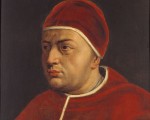
On 11th March 1513, Giovanni di Lorenzo de’ Medici was proclaimed Pope Leo X—a man who would leave a lasting mark on the Catholic Church and European history.
Born into the powerful Medici family, Leo was the son of Lorenzo the Magnificent, ruler of Florence and a patron of the arts. From an early age, Giovanni was destined for the Church—he was made a cardinal at just 13 years old! By the time he was elected pope in 1513, he held not just religious power but also political dominance as head of the Papal States and his influential family in Florence.
But what kind of pope was Leo X? Well, let’s just say he wasn’t your typical, pious, reform-driven leader.
Leo X was a true Renaissance pope. He transformed Rome into a thriving cultural hub, attracting artists, poets, and scholars to his court. One of his most famous protégés was Raphael, the great painter and architect. Under Leo’s patronage, Raphael worked on St. Peter’s Basilica and painted some of his most stunning works.
[Read More...] -
William Paulet, 1st Marquess of Winchester, a Tudor Survivor

William Paulet wasn’t born into the powerful aristocracy. He came from Basing in Hampshire, born sometime between 1474 and 1488—even his birth date is a mystery!
His family had connections, but nothing close to the powerhouses of the Tudor court. Unlike men like Thomas More or Thomas Cromwell, Paulet didn’t make his name by standing on principle or radical reform. Instead, he mastered something far more valuable in the Tudor world: survival.
He trained in law at the Inner Temple, which set him up for a career in administration, and he made a very smart marriage—Elizabeth Capell, the daughter of a wealthy Lord Mayor of London. It wasn’t the grandest match, but it gave him financial backing and key city connections.
[Read More...] -
The Downfall of Germain Gardiner, John Larke & the Prebendaries’ Plot
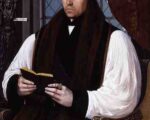
By the early 1540s, England’s religious landscape was a minefield. The dissolution of the monasteries had shaken traditional Catholic structures, and Protestant reformers like Archbishop Thomas Cranmer were pushing Henry VIII’s Church further from Rome.
Not everyone was on board.
A faction of conservative clergy and laymen began working covertly to stop these changes. This movement, known as the Prebendaries’ Plot, was centred around five prebendary canons of Canterbury Cathedral, including William Hadleigh, a former monk of Christchurch Canterbury.
[Read More...] -
Thomas Wriothesley’s Fall

6th March 1547 was a day of humiliation for Thomas Wriothesley, 1st Earl of Southampton. Once one of the most powerful men in England, he found himself stripped of the Great Seal of office and confined to his home. But how did a man who had been Henry VIII’s trusted Lord Chancellor fall so fast?
Wriothesley was a rising star of the Tudor court. Born in 1505, he was the son of a herald, educated at Cambridge, and started his career working for none other than Thomas Cromwell. He was ambitious, intelligent, and, according to his friend John Leland, quite good-looking!
His big break came in the 1530s when he became a key figure in Henry VIII’s government. He played a role in the annulment of Henry’s marriage to Anne of Cleves, helped investigate Catherine Howard, and eventually became Lord Chancellor in 1544. He was trusted, powerful, and wealthy—owning vast estates, including the former Titchfield Abbey, which he transformed into his grand home.
[Read More...] -
Innovation and Panic at the Siege of Antwerp 1584-5 by Loretta Goldberg
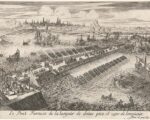
Thank you to Loretta Goldberg, author of The Reversible Mask: An Elizabethan Spy Novel for joining us today and sharing this excellent guest article on the Siege of Antwerp.
During World War II, Sir Winston Churchill said, “In wartime, truth is so precious that she should always be attended by a bodyguard of lies.” Illusion was a tactic used in 1944 to deceive the Nazis about where the allies would land; many historians believe that the Normandy beachhead held because of the deception. 336 years earlier, in 1588, England faced invasion by Spain with its Armada of 120 ships and 20,000 troops that were meant to be supplemented by comparable forces from Spain’s soldiers and barges in the Netherlands (known as the Army of Flanders.) Illusion then also saved England.
[Read More...] -
Mathematician and Inventor William Oughtred

William Oughtred was baptised on 5th March 1575, at Eton College, where his father worked as a writing master. From a young age, he was immersed in learning, and it wasn’t long before he was off to King’s College, Cambridge, where he earned his BA in 1596 and his MA in 1600.
But Oughtred wasn’t just a numbers man—he was also a man of faith. In 1603, he became an ordained priest, and by 1610, he was the Rector of Albury in Surrey, a position he would hold for 50 years!
Now, here’s where things get really interesting. Oughtred wasn’t content just preaching—his real passion was mathematics.
Ever used the × symbol? Thank Oughtred. He also introduced the abbreviations “sin” and “cos” for sine and cosine, which are still used in trigonometry today!
[Read More...] -
Christopher Bales, a Catholic Martyr

On this day in Tudor history, the 4th of March 1590, a man named Christopher Bales met a brutal and unjust end on the streets of London. His crime? Simply being a Catholic priest. His fate was sealed by laws that saw his faith and vocation as treason… and his punishment was death.
But who was Christopher Bales? And why was England so determined to silence men like him?
Christopher Bales was born in County Durham, the son of John and Catherine Bales. He actually came from a Protestant background, so it’s unclear what led him to convert and enter the English College in Reims, France, in 1581—a Catholic seminary where young men trained to become priests in defiance of English law.
[Read More...] -
Margaret Tudor marries for the third time

On this day in Tudor history, 3rd March 1528, Margaret Tudor, sister of King Henry VIII and widow of King James IV of Scotland, married for the third time.
Margaret, 38 years old, had already been twice married. Her first husband, King James IV of Scotland, had died at the Battle of Flodden in 1513, leaving her as regent for their young son, James V. However, her controversial second marriage to Archibald Douglas, 6th Earl of Angus, led to political turmoil. The Scottish nobility opposed the match, and she lost her position as regent. When she returned to Scotland after a brief stay in England, she discovered that Angus had been living openly with a former lover, Lady Jane Stewart. Determined not to remain in an unhappy marriage, Margaret fought for an annulment, despite opposition from none other than her own brother, Henry VIII, who at the time did not believe in divorce.
[Read More...] -
Martin Bucer, a Reformer who wanted Peace

On the night of 28th February 1551, a man who had spent his life fighting for religious reform took his last breath in Cambridge. His name was Martin Bucer—a theologian, a reformer, and a man whose influence stretched across Europe.
But even in death, his struggles weren’t over. Six years after his burial, his body was dug up, put on trial for heresy, and publicly burned in Cambridge along with his works.So, who was Martin Bucer? Why was he considered such a threat that even his bones had to be destroyed? And why is he remembered today as a key figure in the Protestant Reformation?
[Read More...] -
Anne Line, Margaret Clitherow and Margaret Ward – Three Catholic Martyrs

Today, on the anniversary of Anne Line’s execution, on 27th February 1601, I’m honouring her and two other remarkable women, Margaret Clitherow and Margaret Ward, who gave their lives for harbouring Catholic priests in Elizabethan England.
Their crime? Offering sanctuary to men whose very existence had been outlawed. Their fate? Torture, brutal executions, and posthumous sainthood.
But why was it so dangerous to harbour a priest in the reign of Elizabeth I?In Tudor England, religion wasn’t just a matter of personal belief—it was a matter of life and death.
Following Henry VIII’s break with Rome, England became a Protestant nation. But when his daughter Mary I took the throne, she restored Catholicism and a couple of hundred Protestants burned at the stake. Then, in 1558, Elizabeth I became queen, and England swung back to Protestantism.
[Read More...]
Catholics who had hoped for tolerance soon realised that Elizabeth’s government viewed them as a threat. When the Pope excommunicated Elizabeth in 1570, it escalated the conflict. Catholics were now seen as potential traitors—loyal to the Pope, not the queen. -
George Carey, 2nd Baron Hunsdon

He was the grandson of Mary Boleyn, the husband of Elizabeth Spencer, and a trusted courtier of Elizabeth I. But George Carey, 2nd Baron Hunsdon, wasn’t just another nobleman, he was a key figure in the world of Elizabethan theatre, a patron of Shakespeare’s acting company, and a man who rose to one of the most powerful positions at court.
Today, let’s dive into the fascinating life of George Carey, 2nd Baron Hunsdon; his Boleyn connections, his military career, and his role in shaping the golden age of Elizabethan theatre.
[Read More...] -
Elizabeth Carey, Lady Hunsdon

he was the wife of a Boleyn descendant, the patron of some of Elizabeth I’s greatest minds, and a member of the powerful Spencer dynasty, the same family as Princess Diana. Yet, history has largely forgotten Elizabeth Carey, Lady Hunsdon.
Meet Elizabeth Carey (née Spencer), Lady Hunsdon, a Tudor noblewoman who lived a life of influence, power, and cultural significance.
Born on 29th June 1552 at Althorp (yes, the same family estate later associated with Princess Diana!), Elizabeth was part of the powerful Spencer dynasty, being the sixth child of Sir John Spencer and his wife, Katherine Kitson.
Through marriage to Sir George Carey, later 2nd Baron Hunsdon, grandson of Mary Boleyn, in 1574, Elizabeth became linked to the legacy of Anne Boleyn and Queen Elizabeth I. The couple had one daughter, and their marriage was reportedly happy—Carey even described Elizabeth as “the sweetest Companion that ever Man hathe found in this lief.” After Carey’s death in 1603, Elizabeth married Ralph Eure, 3rd Baron Eure. But it was in the world of literature and music that she made her mark.
[Read More...] -
The Scandalous Life of Henry Howard, Earl of Northampton – Murder, Intrigue and Royal Favour

Murder, political betrayal, royal intrigue… The life of Henry Howard, Earl of Northampton, had it all. He was a survivor in a dangerous world, navigating the courts of Elizabeth I and James I, escaping imprisonment five times, and playing a shadowy role in one of the most scandalous murder cases of the 17th century.
But who was he? And how did he go from being a suspected traitor to one of the most powerful men in England? Stick around as we uncover the secrets of this Tudor earl—his rise, his rivalries, and his connection to a deadly conspiracy…
Birthday boy Henry Howard was born into one of England’s most prestigious families on 24th February 1540. But that didn’t mean his life was destined to be easy… because his family was already marked by treason.
His father? None other than Henry Howard, Earl of Surrey—the poet and courtier executed by Henry VIII in 1547 for alleged treason. His brother? Thomas Howard, 4th Duke of Norfolk—executed by Elizabeth I for plotting to marry Mary, Queen of Scots. With this kind of family history, you’d think Henry would learn to stay away from treasonous schemes… but you’d be wrong.
[Read More...] -
The Tragic Tale of Lady Katherine Grey

On this day in Tudor history, 21st February 1568, Lady Katherine Grey, Countess of Hertford, was laid to rest at Yoxford. But her story doesn’t end there. Years later, her grandson reinterred her remains in the Seymour family tomb at Salisbury Cathedral.
Katherine Grey’s life may have been short—she was only around twenty-seven when she died—but it was filled with political intrigue, imprisonment, and heartbreak. She was a granddaughter of Mary Tudor, Queen of France, and Charles Brandon, Duke of Suffolk, making her a first cousin once removed to Queen Elizabeth I. More significantly, she was the younger sister of Lady Jane Grey, the so-called ‘Nine Days’ Queen.’ And like Jane, Katherine’s royal blood made her both a pawn and a threat in Tudor politics.
[Read More...] -
Anne Herbert (née Parr), Countess of Pembroke and a Queen’s sister

She served five of Henry VIII’s queens, witnessed scandal, betrayal, and power shifts, and became the closest confidante of the last Tudor queen consort—yet history has largely forgotten her.
She was Anne Herbert (née Parr), Countess of Pembroke, the younger sister of Catherine Parr.
Anne played a key role in Tudor court life, navigating its dangers with intelligence and grace. She stood beside queens who lost their heads, carried out high-stakes royal duties, and even found herself entrusted with the doomed Catherine Howard’s jewels.
But who was Anne Herbert beyond her royal connections? What was her true role at court? And how did she manage to stay in favour through so many royal changes?
[Read More...] -
Lady Margaret Douglas, a Royal Rebel

On this day in Tudor history, 19th February 1567, while imprisoned in the Tower of London, Lady Margaret Douglas, Countess of Lennox, received devastating news – her son, Henry Stuart, Lord Darnley, King of Scotland, had been brutally murdered at Kirk o’ Field in Edinburgh.
But this wasn’t just the loss of a son, it was the destruction of her dynastic ambitions, the shattering of her hopes for the future, and yet another chapter of heartbreak in Margaret’s turbulent life.
So, who was Margaret Douglas, why was she in the Tower, and what did this moment mean for her—and for the tangled web of Tudor and Stuart politics?
Margaret Douglas was no ordinary noblewoman, she was a granddaughter of Henry VII, and the daughter of Margaret Tudor (Henry VIII’s sister) and her second husband, Archibald Douglas, 6th Earl of Angus. This made her a first cousin to Edward VI, Mary I and Elizabeth I, and a serious contender for the English throne in the eyes of many.
[Read More...] -
Mary I and Elizabeth I – Similarities and Differences
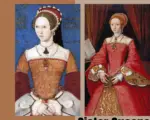
On 18th February 1516, Mary I of England was born, a Tudor princess who would go on to become England’s first crowned queen regnant. To commemorate her birth, I want to explore the fascinating similarities and stark differences between Mary I and her half-sister, Elizabeth I.
Both were daughters of Henry VIII, both were queens in their own right, and both faced incredible challenges. But while Mary’s reign lasted just five years, Elizabeth ruled for over 44 years, shaping what is often seen as England’s Golden Age.
So, what did these two queens have in common? And where did they differ?
[Read More...] -
Mary, Queen of Scots falls for Lord Darnley’s charms
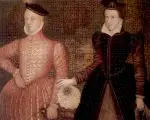
On 17th February 1565, Mary, Queen of Scots met Henry Stuart, Lord Darnley at Wemyss Castle in Scotland, and fell in love.
It seemed like a fairy tale. Darnley was young, tall, handsome, and charming. He was of royal blood, with claims to both the Scottish and English thrones. He was the son of Lady Margaret Douglas—Mary’s own cousin—and Matthew Stuart, Earl of Lennox, whose family had spent years in exile after being declared traitors. The House of Lennox had once supported Henry VIII’s attempts to control Scotland, and by the 1560s, they were eager to regain their influence.
But for Mary, Darnley appeared to be the perfect husband – a man who could help her strengthen her claim to the English throne, provide her with heirs, and reinforce her position in Scotland. Plus she’d rather fallen under his spell – he was quite the charmer.
Yet, this love match was one of the worst decisions she ever made – a decision that set her on a course toward scandal, betrayal, and ultimately, her downfall.
[Read More...] -
Love, Scandal & Romance in Tudor Times – A Valentine’s Day Special

Valentine’s Day is all about love, and what better way to celebrate than by diving into some fascinating Tudor romance? Whether it was passionate devotion, scandalous affairs, or tragic endings, love in the Tudor era was rarely simple.
In my Teasel’s Tudor Trivia, I explore how Valentine’s Day was celebrated in Tudor England – from medieval love letters to a ‘Secret Santa’ style tradition!
And in my special Tudor Love Stories video, I take a look at some of history’s most captivating couples – from Mary Boleyn’s scandalous secret marriage to Elizabeth I’s forbidden love for Robert Dudley.
[Read More...] -
The Executions of Queen Catherine Howard and Jane Boleyn, Lady Rochford

On this day in Tudor history, 13th February 1542, Catherine Howard, the fifth wife of Henry VIII, and Jane Boleyn, Lady Rochford, were executed at the Tower of London.
Their crime?
Treason against the king – but was Catherine guilty of more than youthful indiscretion? And why was Jane condemned alongside her?
The story of Catherine Howard is one of ambition, betrayal, and a tragic downfall. A young queen who once captured the heart of Henry VIII, she would ultimately face the same fate as her infamous cousin, Anne Boleyn. But Catherine’s downfall wasn’t just about her past—her secret meetings with Thomas Culpeper proved to be her undoing.
[Read More...] -
James Fenn – A solid alibi but still found guilty?

On this day in Tudor history, 12th February 1584, five Catholic priests, including James Fenn, were brutally executed at Tyburn. Their crime? Simply practising their faith in Elizabethan England.
James Fenn’s story is one of faith, resilience, and, ultimately, martyrdom. A man who had once been a scholar, a husband, and a father found himself condemned to a traitor’s death, despite his insistence that he was innocent of the charges against him. His final moments, including a heart-wrenching farewell to his little daughter, make this one of the most tragic yet compelling stories of the Elizabethan persecution of Catholics.
So, who was James Fenn, and how did he end up on the scaffold at Tyburn?
[Read More...] -
Elizabeth of York, Queen of Hearts

On this day in Tudor history, 11th February 1466, Elizabeth of York was born at Westminster Palace.
She was the daughter of a king, the sister of the Princes in the Tower, the wife of Henry VII, the mother of Henry VIII, and the grandmother of Edward VI, Mary I, Elizabeth I and James V. Her bloodline shaped the future of England, but she’s often overshadowed by the powerful men and women she was related to.
But Elizabeth was no passive figure. She was a key part of dynastic politics, and her marriage helped end the Wars of the Roses. Today, I’m exploring her remarkable life, her role in uniting the warring houses of Lancaster and York, and why she truly deserves to be remembered as the Queen of Hearts.
[Read More...] -
Henry Neville, 5th Earl of Westmorland, his magic ring and his murderous plotting
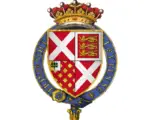
On this day in Tudor history, 10th February 1564, Henry Neville, 5th Earl of Westmorland, died—but not before leaving behind a legacy of scandal, treason, and… magic?
In 1536, at just 11 years old, Henry Neville, who was the eldest son of Ralph Neville, 4th Earl of Westmorland, and Catherine Stafford, and the grandson of the executed Edward Stafford, 3rd Duke of Buckingham, was taken hostage during the Pilgrimage of Grace, a major Tudor rebellion. His captors used him as a bargaining chip to force his father’s compliance—quite the dramatic start to his life!
By 1546, Neville had racked up huge gambling debts and was desperate for a way out. So what did he do? He purchased a magical ring that supposedly summoned angels to help clear his debts! Spoiler alert: it didn’t work, and he landed in Fleet Prison.
[Read More...] -
Mary, Queen of Scots, prepares to die

On this day in Tudor history, 7th February 1587, a fateful message arrived at Fotheringhay Castle – the execution warrant for Mary, Queen of Scots. After years of imprisonment and political intrigue, her fate was sealed. But how did Mary react when she was told she would die the next morning? What did she do in her final hours?
Today, we’re travelling back in time to Mary’s last evening on earth—her defiant words, her final prayers, and the preparations she made for her death. This is the story of a queen who faced the axe with courage and unwavering faith.
Mary, Queen of Scots, had been tried for treason in October 1586 after being implicated in the Babington Plot, a plot to depose Queen Elizabeth I and to replace her with Mary. She had been found guilty and sentenced to death, but Elizabeth would not sign the execution warrant, not wanting the responsibility of killing an anointed queen. However, Mary’s gaoler, Sir Amias Paulet, would not agree to quietly doing away with Mary, and after pressure from her council and petitions from Parliament, Elizabeth finally signed the warrant, although she later said she had asked for it not to be sent to Fotheringhay yet.
[Read More...] -
The Royal Family’s connection to the Boleyns and Tudors, and beyond

Today marks the anniversary of the accession of the late Queen Elizabeth II on 6th February 1952. She was the longest reigning monarch in British history, ruling from this day in 1952 until her death in September 2022. As we reflect on her remarkable reign, I thought it would be fitting to explore an intriguing piece of history—the present royal family’s descent from both the Tudors and the Boleyns.
Yes, you heard that right! King Charles III has Tudor blood AND Boleyn blood.
But wait—how is that possible? The last Tudor monarch, Elizabeth I, died childless, and as we all know, she was Anne Boleyn’s only surviving child. So where does the royal family’s Tudor-Boleyn connection come from?
Let’s unravel this fascinating royal lineage…
[Read More...]

